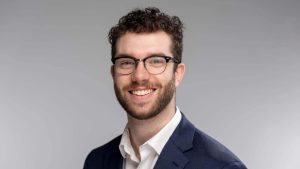Michael Delorge Chosen as 2024 UMaine Co-Valedictorian

This year, Michael Delorge was chosen as a co-valedictorian for the 2024 graduating class. Michael started his academic career intent on attending med school and becoming a physician, but at UMaine discovered public policy research and bridged his two disciplines to emerge as a dual degree student in political science and biology. We could not be more thrilled for Michael, as he is an extraordinarily talented and deserving student (and our department’s second valedictorian in the last three years!).
Michael is without a doubt, one of the brightest and hardest-working students I have ever worked with, clearly evident from his academic performance. But he’s so much more than that.
From the moment Michael arrived on campus, he has been working to make the campus community a better place. He worked to help register students to vote during the height of the pandemic in his first year, a year in which Michael and his team of voting ambassadors helped register 86% of the student body to vote at the height of COVID). More recently, as president of UMaine Student Government, Michael’s work has included helping to shepherd the campus community through the tragedy in Lewiston earlier this academic year. In his work with UMaine Partners for World Health, Michael is helping organize his fellow students, ensuring access to life-saving medical supplies around the world.
But I know Michael most closely from my role as his research mentor, guiding Michael in work that he did on evidence-based policy approaches to substance use and the overdose crisis from 2021 through this year. That research started as part of a year-long research project in partnership with an organization called the Maine Recovery Advocacy Project (ME-RAP), that works here in Maine to center the lived experience of those in recovery from substance use disorder and use their perspectives to shape public policy.
At this point, I should note that Michael came to that project as a second-year biology student, enthusiastic about taking a senior level public policy course. This was a course outside his major and typically not an option for a student only entering their third semester in college. But I knew Michael from his work the prior year on student voting and wanted him to be involved. I’m so glad he was a part of this project.
Michael and his team developed and launched a statewide survey of the recovery community in Maine in close partnership with ME-RAP, our collaborators. The work they did was extraordinary, and it’s still shaping policy conversations happening in Augusta and beyond.
That year, Michael and his team provided the public attitudes research that helped ME-RAP and their coalition partners develop and pass eleven pieces of critical state legislation, including the strongest “Good Samaritan” protections in the country. These measures protect those who intervene to seek help during a potentially fatal overdose from arrest and prosecution for minor, non-violent crimes. They are a critical life-saving tool in addressing out state’s opioid and overdose crises.
With the data that Michael and his team generated, ME-RAP was able to approach lawmakers, journalists, the public and say “this is what those with lived experience of addiction and recovery are asking us to do.” That session, reacting to the powerful evidence the project was collecting and the equally compelling testimony of those with lived experience, lawmakers listened.
That legislation has saved lives. It continues to save lives and it’s a critical piece of the statewide response to the overdose crisis. At the end of that experience, Michael came to me and said “I think this is important and I want to continue to work on this issue.” This is a pattern with Michael. He said this to me a lot over the course of his academic career, as an initial inquiry into a subject became a catalyst to pursue a project further.
Michael worked on research related to substance use and public health policy for an additional two years. At the close of his undergraduate academic career, Michael is on the cusp of developing an empirical measure, similar to “social determinants of health” but for recovery from substance use disorder. This measure captures the social and environmental conditions necessary for an individual to succeed on the difficult, often lengthy, often non-linear, road to recovery from problematic substance use.
This will be an immensely valuable tool for those interested in substance use as a public health issue. What’s more, it will play a critical role in ensuring that policy in this area is evidence-based and centered upon those with lived experience.
I don’t entirely know what Michael’s future holds. This may be somewhat unclear even to Michael at this point. It is likely his future trajectory will involve critically important work at the intersection of public policy and public health, armed with
But whatever he does, that work is going to be amazing. I’m extraordinarily grateful, as is everyone in the department, that Michael chose to devote his incredible talents and energy to this university, and to conduct research on such a critically important issue within our department.
Simply put, we’re just thrilled to see him recognized as one of this year’s valedictorians. He is tremendously deserving of this honor. Congratulations, Michael.
–Rob Glover, Associate Professor of Political Science and Honors
